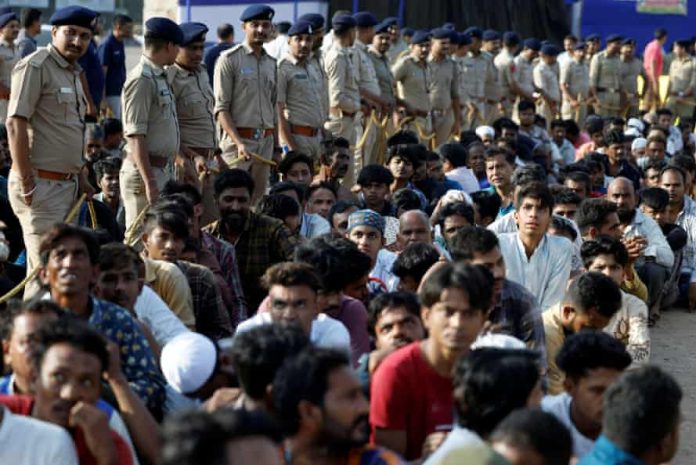Murshidabad, West Bengal — Three Muslim men from Murshidabad, who were wrongfully deported to Bangladesh by India’s Border Security Force (BSF), have returned home with severe physical injuries and deep emotional trauma. The victims — Mehbub Sheikh, Nizamuddin Sheikh, and Minarul Sheikh — were among seven migrant workers forcibly pushed across the border into Bangladesh on June 14, despite possessing Indian identity documents.
Mehbub Sheikh, a 36-year-old mason, has been bedridden since his return. His brother, Mujibur Sheikh, told the TRT Global, “The BSF beat him so brutally that they assumed he was dead and dumped him on the other side of the fence.” On June 16, the West Bengal police brought him back to his village, Hossain Nagar, after a prolonged political and administrative struggle.
All seven workers hail from Murshidabad district and were working in Mumbai and Thane. They were arrested between June 9 and 10 by Maharashtra police on suspicion of being “illegal Bangladeshi immigrants.” The deportations, reportedly carried out under Union Home Ministry directives targeting alleged undocumented Bangladeshis and Rohingya refugees, occurred in the aftermath of the April 22 Pahalgam attack in Kashmir, which killed 26 people, mostly Hindus.
On June 13, the detained men were flown from a military base in Pune to airbases in Siliguri and Agartala. According to Minarul Sheikh, about 160 Bengali-speaking Muslims were on the flight. “Our documents, phones, and even our money were taken and thrown away,” he said.
He recounted that their hands were tied, and they were divided into groups upon landing, later bussed to BSF camps. After hours in custody and repeated beatings — especially when they stated they were from Murshidabad — they were taken to the border in the dead of night.
“The BSF cocked their guns and said, ‘Cross or we’ll shoot you dead,’” Minarul recounted. “We crossed the border only because they forced us at gunpoint.”
Minarul, a businessman trading in human hair, was arrested for making a business-related phone call to a Bangladeshi client. Despite possessing an Aadhaar card and voter ID, the Mumbai police dismissed his credentials as fake. “They said Aadhaar can be bought for Rs 200,” he recalled.
He was even asked to sing the Indian national anthem to prove his citizenship. “I couldn’t recall the lines — I’m not literate,” said Nizamuddin, another returnee. “Is that how we prove we’re Indian now?”
After a viral video of their ordeal circulated online, BSF reluctantly conducted a flag meeting with Bangladesh’s Border Guards on June 15. Three individuals — Mehbub, Nizamuddin, and another man, Mostafa Kamal — were handed back to Indian police in Cooch Behar the next day.
Samirul Islam, Chairman of the West Bengal Migrant Workers Welfare Board and a Rajya Sabha MP from the Trinamool Congress, said, “Despite submitting all proof of their Indian citizenship, the Maharashtra police never coordinated with us. It was only after intervention from Chief Minister Mamata Banerjee that the BSF brought them back.”
Human rights activists and politicians claim the deportations were driven by a combination of religious and linguistic profiling. Kirity Roy of Banglar Manabadhikar Surakha Mancha (MASUM) questioned, “Is West Bengal not part of India? They were treated like outsiders just because they speak Bengali.”
Chief Minister Mamata Banerjee stated that over 300-400 West Bengal residents are still held in detention centres in Rajasthan. “Even valid documents don’t help if you’re a Bengali-speaking Indian Muslim,” she said.
Legal expert Sanjay Hegde explained that the “pushback” method used by the BSF lacks legal process and is in violation of human rights.
As the dust settles, the trauma remains. “Even if I’m home now, how can I trust that my own country won’t throw me away again?” asked Mehbub.
“It’s the price we pay for being Bengali Muslims,” Minarul added with anguish.




